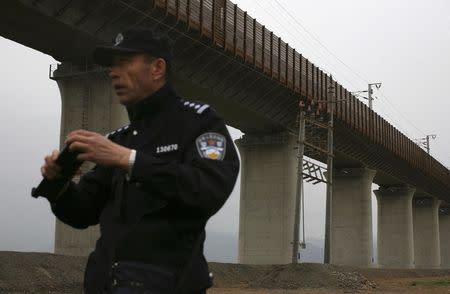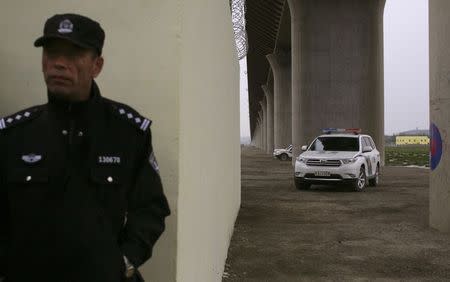China shrugs off security concerns on new link to restless west
By Michael Martina TURPAN China (Reuters) - China showed off its first high-speed rail link to the restive far western region of Xinjiang on Tuesday, promising that it could guarantee the security of an important economic project despite a recent serious escalation in violence. Officials are still testing the line, which will run from the central western city of Lanzhou to Xinjiang's capital Urumqi, drastically reducing travel times to the energy-rich region located strategically on the borders of Central Asia. If tests go to plan, Xinjiang's first high-speed rail could be open to passengers within a year, officials told reporters on a government-organized tour of the train. Li Suping, the Urumqi Railway public security bureau vice chief, said that ensuring security over the line was a challenge police could handle, even as the government says it faces a growing threat from Islamist militants. "We have confidence and the ability to guarantee the security of our lines and the security of our passengers. We adopted measures at stations and on the lines. We believe these measures are effective and are suited to the reality facing us," Li told reporters as the train cut through rugged, high-wind desert terrain east of Urumqi on the way to the oasis city of Turpan. Xinjiang has been beset by violence for years, which has pitted members of the Muslim Uighur people who call Xinjiang home against the Han Chinese who make up the majority of China's population. Many Uighurs, who speak a Turkic-language, chafe at Chinese government controls on their culture and religion and complain at being left out of Xinjiang's development, though Beijing says they are granted wide-ranging freedoms and that it is generous in supporting the region's minority peoples. Last month, five suicide bombers hit an Urumqi market, killing 39 people in the deadliest attack ever in Xinjiang. A few weeks earlier, a bomb went off at an Urumqi railway station, killing one person and wounding 79. As well as massively stepping up security, China has been pouring money into Xinjiang's development in an implicit recognition of the economic causes of some of the unrest, and the new rail line is part of that strategy. Vice Xinjiang governor Aierken Tuniyazi said the rail link would reduce the current 40-hour train ride from Beijing by more than 10 hours. "The construction and operation of this rail line will greatly ... benefit the further opening of the west and will provide a firm foundation for the establishment of the Silk Road economic belt," he said, referring to Beijing's plans to better integrate development with Central Asia. However, he avoided a question about whether the new train would only speed the arrival of Han migrants into Xinjiang, another cause of Uighur discontent. Portions of the 710-km Xinjiang stretch of the track run through wide-open and easily accessible grazing lands or desert, making protection of the line a daunting challenge for authorities that have struggled to get a handle on the spate of attacks over the past year or more. "It's a challenge for us, but we feel that through our effective measures we can absolutely handle and respond to these challenges," security official Li said. All trains have armed personnel on board, the numbers - often two or three - depending on the length of the line and the number of passengers, he added. Li said there would be no delay in opening the line due to security concerns. "Once construction is complete ... on the security aspect, there is no problem," he added. "If there was any impact (from the recent attacks), it's that we are now even more cautious." (Writing by Ben Blanchard)


